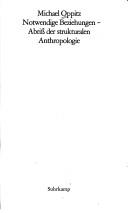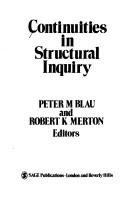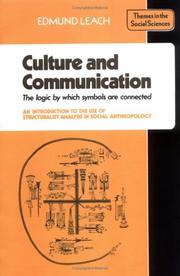| Listing 1 - 10 of 16 | << page >> |
Sort by
|
Book
ISBN: 0713910216 Year: 1977 Publisher: London Lane
Abstract | Keywords | Export | Availability | Bookmark
 Loading...
Loading...Choose an application
- Reference Manager
- EndNote
- RefWorks (Direct export to RefWorks)
Structural anthropology --- Anthropology, Structural --- Ethnology --- Philosophical anthropology

ISBN: 3518077015 Year: 1975
Abstract | Keywords | Export | Availability | Bookmark
 Loading...
Loading...Choose an application
- Reference Manager
- EndNote
- RefWorks (Direct export to RefWorks)
Ethnology. Cultural anthropology --- Structural anthropology --- Anthropology, Structural --- Ethnology
Book
ISBN: 2259011373 9782259011372 Year: 1984 Publisher: Paris Plon
Abstract | Keywords | Export | Availability | Bookmark
 Loading...
Loading...Choose an application
- Reference Manager
- EndNote
- RefWorks (Direct export to RefWorks)
Lévi-Strauss, Claude --- Ethnology. --- Structural anthropology. --- Anthropologie sociale et culturelle --- Anthropologie structurale --- Structural anthropology --- Ethnology --- 840-82 LÉVI-STRAUSS, CLAUDE --- Anthropology, Structural --- Cultural anthropology --- Ethnography --- Races of man --- Social anthropology --- Anthropology --- Human beings
Book
ISBN: 0521253225 0521273110 0511659849 0511868545 Year: 1983 Volume: 46 Publisher: Cambridge : Cambridge University Press,
Abstract | Keywords | Export | Availability | Bookmark
 Loading...
Loading...Choose an application
- Reference Manager
- EndNote
- RefWorks (Direct export to RefWorks)
Hage and Harary present a comprehensive introduction to the use of graph theory in social and cultural anthropology. Using a wide range of empirical examples, the authors illustrate how graph theory can provide a language for expressing in a more exact fashion concepts and notions that can only be imperfectly rendered verbally. They show how graphs, digraphs and networks, together with their associated matrices and duality laws, facilitate the study of such diverse topics as mediation and power in exchange systems, reachability in social networks, efficiency in cognitive schemata, logic in kinship relations, and productivity in subsistence modes. The interaction between graphs and groups provides further means for the analysis of transformations in myths and permutations in symbolic systems. The totality of these structural models aids in the collection as well as the interpretation of field data. The presentation is clear, precise and readily accessible to the nonmathematical reader. It emphasizes the implicit presence of graph theory in much of anthropological thinking.
Sociological theories --- Ethnology. Cultural anthropology --- Structural anthropology --- Graph theory --- Ethnology --- Anthropologie structurale --- Théorie des graphes --- Anthropologie sociale et culturelle --- Mathematics --- Mathématiques --- Graph theory. --- Structural anthropology. --- Mathematics. --- Théorie des graphes --- Mathématiques --- Social Sciences --- Anthropology --- Cultural anthropology --- Ethnography --- Races of man --- Social anthropology --- Human beings --- Graphs, Theory of --- Theory of graphs --- Combinatorial analysis --- Topology --- Anthropology, Structural --- Extremal problems

ISBN: 0803998082 Year: 1981 Publisher: Beverly Hills Sage
Abstract | Keywords | Export | Availability | Bookmark
 Loading...
Loading...Choose an application
- Reference Manager
- EndNote
- RefWorks (Direct export to RefWorks)
Political sociology --- Social structure --- Structural anthropology --- Structuralism --- Structure sociale --- Structuralisme --- Congresses --- Congrès --- -Structural anthropology --- -Structuralism --- -#SBIB:316.21H51 --- Structure (Philosophy) --- Philosophy --- Whole and parts (Philosophy) --- Form (Philosophy) --- Poststructuralism --- Anthropology, Structural --- Ethnology --- Organization, Social --- Social organization --- Anthropology --- Sociology --- Social institutions --- Theoretische sociologie: structuralisme, poststructuralisme --- Congrès --- #SBIB:316.21H51
Book
ISBN: 023104514X Year: 1979 Publisher: New York (N.Y.): Columbia university press
Abstract | Keywords | Export | Availability | Bookmark
 Loading...
Loading...Choose an application
- Reference Manager
- EndNote
- RefWorks (Direct export to RefWorks)
Philosophical anthropology --- Physiology of nerves and sense organs --- Affective and dynamic functions --- Religious studies --- 291.3 --- Neurophysiology --- Neuropsychology --- Rites and ceremonies --- Structural anthropology --- Anthropology, Structural --- Ethnology --- Ceremonies --- Cult --- Cultus --- Ecclesiastical rites and ceremonies --- Religious ceremonies --- Religious rites --- Rites of passage --- Traditions --- Ritualism --- Manners and customs --- Mysteries, Religious --- Ritual --- Psychophysiology --- Nervous system --- Neurobiology --- Physiology --- Godsdienstwetenschap: cultus; liturgie --- 291.3 Godsdienstwetenschap: cultus; liturgie

ISBN: 052129052X 052121131X 1316040658 0511607687 9780521290524 9780521211314 9780511607684 Year: 1976 Publisher: Cambridge : Cambridge University Press,
Abstract | Keywords | Export | Availability | Bookmark
 Loading...
Loading...Choose an application
- Reference Manager
- EndNote
- RefWorks (Direct export to RefWorks)
Edmund Leach's book investigates the writings of 'structuralists,' and their different theories: the general incest theory and of animal sacrifice. This book is designed for the use of teaching undergraduates in anthropology, linguistics, literary studies, philosophy and related disciplines faced with structuralist argument. It provides the prolegomena necessary to understand the final chapter of Levi-Strauss's massive four-volume Mythologiques. Some prior knowledge of anthropological literature is useful but not essential. The principal ethnographic source is the Book of Leviticus; this guide should help anyone who is trying to grasp the essentials of 'seminology' - the general theory of how signs and symbols come to convey meaning. The author's core thesis is that: 'the indices in non-verbal communication systems, like the sound elements in spoken language, do not have meaning as isolates, but only as members of set'; the book's special merit is that it makes this kind of jargon comprehensible in terms of our everyday experience.
#SBIB:39A2 --- #SBIB:309H504 --- Structural anthropology --- Semiotics --- Anthropology, Structural --- Semeiotics --- Semiology (Linguistics) --- Antropologie: methoden en technieken --- Code en boodschap: sociologische, antropologische benadering --- Ethnology --- Semantics --- Signs and symbols --- Structuralism (Literary analysis) --- Mass communications --- Ethnology. Cultural anthropology --- Semiotics. --- Structural anthropology. --- Anthropologie structurale --- Sémiotique --- Social Sciences --- Anthropology
Book
ISBN: 2804111822 9782804111823 Year: 1989 Volume: vol *15 Publisher: Bruxelles : Paris : Editions Universitaires, De Boeck Université ;
Abstract | Keywords | Export | Availability | Bookmark
 Loading...
Loading...Choose an application
- Reference Manager
- EndNote
- RefWorks (Direct export to RefWorks)
Lévi-Strauss, fondateur de l'anthropologie structurale, est-il un philosophe ? Dans "Tristes Tropiques", il affiche sans détour son "dégoût" de la philosophie ; pourtant, il renouvelle tous les grands problèmes philosophiques contemporains : les oppositions sujet/objet, nature/culture, la question de l'homme, le sens de l'histoire, etc. Pour articuler ce paradoxe, il fallait d'abord renouer les fils des débats de Lévi-Strauss avec certains des plus grands philosophes contemporains. Ceux-ci ont souvent dénié à l'anthropologie structurale toute originalité proprement philosophique. Les phénoménologues l'ont accusée de reconduire le primat de l'objet - c'est-à-dire de n'être qu'un scientisme (C. Lefort, P. Ricoeur, J.-P. Sartre, etc.). Les penseurs de la différence l'ont soupçonnée à l'inverse d'être soumise au concept de nature - c'est-à-dire de rester malgré tout une métaphysique (J. Derrida, U. Eco). Mais les lectures sont-elles toujours à la hauteur de la pensée de Lévi-Strauss ? Il fallait aussi délivrer l'anthropologie structurale de certains "clichés" (la fidélité au "modèle linguistique" de Saussure, la dette envers le naturalisme de Rousseau). On montre ici que l'oeuvre de Lévi-Strauss est gouvernée par toute une philosophie du jeu plus ou moins explicite : les métaphores récurrentes du kaléidoscope, du jeu de roulettes, du bricolage, des jeux de miroirs, des cartes à jouer, etc., dessinent, en creux de l'étude des systèmes de parenté et des mythes, les contours d'une pensée structurale inventive et audacieuse, sans commune mesure avec l'image souvent répandue d'un structuralisme dogmatique et desséchant. Ce livre tient donc un pari : que Lévi-Strauss est un authentique philosophe. Non qu'il ait élaboré un véritable système philosophique. C'est seulement au titre des paradoxes et des métaphores que sa pensée fait naître, et surtout du dialogue qu'elle entretient (parfois malgré elle) avec la philosophie et les philosophes, que l'on peut compter Lévi-Strauss au nombre de ces derniers.
Philosophical anthropology --- Ethnology. Cultural anthropology --- Lévi-Strauss, Claude --- Filosofie --- Lévi-Strauss, C. --- Philosophie --- Structural anthropology --- Philosophy. --- 1 LEVI-STRAUSS, CLAUDE --- 165.75 --- -Anthropology, Structural --- Ethnology --- Filosofie. Psychologie--LEVI-STRAUSS, CLAUDE --- Structuralisme. Systeemanalyse. Systeembegrip. Systeemmethodologie. Systeemleer --- Philosophy --- Levi-Strauss, Claude --- -Levi-Stros, Klod --- Strauss, Claude Lévi --- -Shtrāwus, Klūd Līvī --- Lebi-Sŭtʻŭrosŭ --- Lévy-Strauss, Claude --- לוי־שטראוס, קלוד --- Liwei- shituo, Kelaode --- -Filosofie. Psychologie--LEVI-STRAUSS, CLAUDE --- -Philosophy --- 165.75 Structuralisme. Systeemanalyse. Systeembegrip. Systeemmethodologie. Systeemleer --- 1 LEVI-STRAUSS, CLAUDE Filosofie. Psychologie--LEVI-STRAUSS, CLAUDE --- -165.75 Structuralisme. Systeemanalyse. Systeembegrip. Systeemmethodologie. Systeemleer --- Anthropology, Structural --- Lévi-Strauss, Claude --- Lévi-Strauss, Claude. --- Criticism and interpretation --- History --- Lévi-Strauss, Claude. --- Anthropologie structurale --- Levi-Stros, Klod --- Klūd ,Līfī Strūs --- ليفي ستروس, كلود --- Structural anthropology - Philosophy. --- Anthropologie structurale. --- Lévi-Strauss, Claude, --- Philosophie. --- 李維史陀

ISBN: 0525473580 Year: 1974 Publisher: New York Dutton
Abstract | Keywords | Export | Availability | Bookmark
 Loading...
Loading...Choose an application
- Reference Manager
- EndNote
- RefWorks (Direct export to RefWorks)
Ethnology. Cultural anthropology --- Lévi-Strauss, Claude --- Structural anthropology. --- Anthropologie structurale --- Lévi-Strauss, Claude. --- #SBIB:316.21H51 --- #SBIB:39A1 --- Structural anthropology --- Anthropology, Structural --- Ethnology --- Theoretische sociologie: structuralisme, poststructuralisme --- Antropologie: algemeen --- Levi-Strauss, Claude --- Levi-Stros, Klod --- Strauss, Claude Lévi --- -Shtrāwus, Klūd Līvī --- Lebi-Sŭtʻŭrosŭ --- Lévy-Strauss, Claude --- לוי־שטראוס, קלוד --- Liwei- shituo, Kelaode --- Lévi-Strauss, Claude. --- Lévi-Strauss, Claude --- Klūd ,Līfī Strūs --- ليفي ستروس, كلود
Book
ISBN: 0333235274 Year: 1979 Publisher: London Macmillan
Abstract | Keywords | Export | Availability | Bookmark
 Loading...
Loading...Choose an application
- Reference Manager
- EndNote
- RefWorks (Direct export to RefWorks)
Structural anthropology --- 130.2:316 --- Anthropology, Structural --- Ethnology --- 130.2:316 Filosofie van de cultuur. Cultuurfilosofie. Cultuursystemen. Kultuurfilosofie-:-Sociologie --(algemeen) --- Filosofie van de cultuur. Cultuurfilosofie. Cultuursystemen. Kultuurfilosofie-:-Sociologie --(algemeen) --- Lévi-Strauss, Claude. --- Political philosophy. Social philosophy --- Lévi-Strauss, Claude --- Lévi-Strauss, Claude --- Levi-Stros, Klod --- Strauss, Claude Lévi --- -Shtrāwus, Klūd Līvī --- Lebi-Sŭtʻŭrosŭ --- Klūd ,Līfī Strūs --- Lévy-Strauss, Claude --- לוי־שטראוס, קלוד --- ليفي ستروس, كلود --- Liwei- shituo, Kelaode --- 李維史陀
| Listing 1 - 10 of 16 | << page >> |
Sort by
|

 Search
Search Feedback
Feedback About
About Help
Help News
News